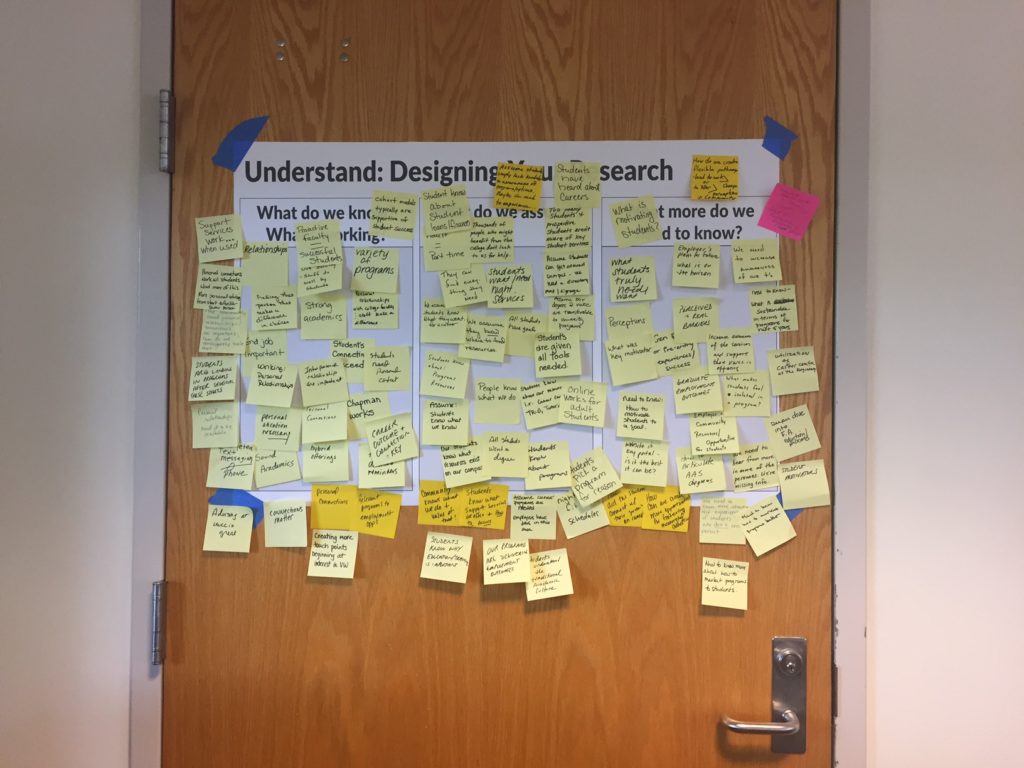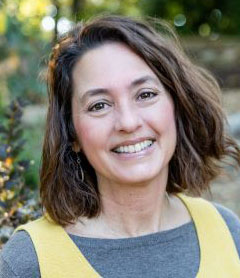What’s the “secret sauce” for student success?
You may already have a hunch.
Because it came up time and again during the first design thinking session facilitated by the Education Design Lab on April 30.
About 30 faculty, staff, and administrators from the college (including Dr. Sandel) gathered in the Natural Science Center for a three-hour session to learn more about design thinking and how it relates to our G3 Healthcare Pathways Design Challenge (catch up on the backstory here).
Our special guests for the day included Todd Estes, Director of Career Education Programs and Workforce Partnerships, who is overseeing the G3 initiative for the VCCS, as well as eight students in various healthcare programs. We were thrilled so many students were able to participate, as students are the heart of our mission and this design thinking process.
Small groups of our faculty and staff interviewed each of the eight students, starting with these questions:
- Tell me about your decision to attend VWCC? Why?
- What has been your favorite experience at VWCC?
- What could have gone better?
- Tell me about your major and how you decided on that path.
- What are your goals after graduation? Tell me more about how you got to this decision.
- What are your goals five or ten years out? Who has helped influence these goals?
The discussion was robust — and it’s hard for me to capture all of the insights — but I thought I would focus on a recurring theme that we heard reported out from multiple interview teams that day.
Over and over again, the students talked about the personal relationships they have developed on their Virginia Western journey. Anne Marie Battista, one of our guests from the Education Design Lab, called these personal relationships the “secret sauce.”
Students mentioned faculty members, tutors, advisors, and TRiO coaches who made the difference. Studies show good relationships — more than money or fame — are what keep people healthy and happy throughout their lives, so no big surprises here.
These relationships also relate to more themes that emerged during the session, such as educating students about the resources and supportive services already available at Virginia Western (perhaps we regularly refresh faculty and staff memories during in-service?) and helping prospective students become more familiar with our campus (a visit to an actual lab classroom is what made one student finally follow through with her application). I’m reminded of our summer camps and the free movies we offer in Whitman, which can help kids and their parents get more comfortable with campus years before they even consider enrolling.
Later in the session, the group was asked to add some sticky notes under a series of questions, including: What more do we need to know?

I zeroed in on one of the anonymous stickies, which asked: “How can we create more opportunities for fostering meaningful connections?”
I interpret “meaningful connections” as going beyond our hard-working faculty, advisors, and staff (all of whom can only connect so much) to include other students, mentors, employers, and alumni — as well as “meaningful” experiential learning opportunities (internships, apprenticeships, community service) that make lessons concrete and relevant. Perhaps we should consider the college’s role not just as an educator or training provider … but as a connector … a bridge builder … a community builder … which helps our students become the changemakers they want to be (another observation shared during the session).
I’ll be chewing on “meaningful connections” as we continue our G3 journey … to see how we can amplify those opportunities within the stackable career pathways required by the grant project.
Social interaction already seems to be a major theme on my blog, as I have explored:
- How to have more fun with your coworkers
- How to strengthen relationships with your work teams
- Why I wear a Virginia Western ball cap on the weekends
As always, I would love to hear your ideas on that topic and any questions you may have about G3. I’ll be sure to post occasional updates on our progress.
– Stephanie Ogilvie Seagle, sseagle@virginiawestern.edu
This initiative is 100% supported by a federal U.S. Department of Labor, Employment and Training Administration Workforce Innovation and Opportunity Act (WIOA) award made to Virginia Western Community College by the pass-through entity, Virginia Community College System. The total program cost for this initiative is $176,068.






 Shelley Lyons is glad to be back on campus as she is a Virginia Western alum, and has served as the Administrative Officer for Grants Administration at Virginia Western since early 2022. Prior to VWCC, her career focus was within the Human Services and Arts fields. She wrote her first grant in 1996 on a whim and has continued to plan and learn since that time. She most enjoys seeing a well-planned project come to fruition, where funder, project manager and beneficiaries can all feel success and see impact.
Shelley Lyons is glad to be back on campus as she is a Virginia Western alum, and has served as the Administrative Officer for Grants Administration at Virginia Western since early 2022. Prior to VWCC, her career focus was within the Human Services and Arts fields. She wrote her first grant in 1996 on a whim and has continued to plan and learn since that time. She most enjoys seeing a well-planned project come to fruition, where funder, project manager and beneficiaries can all feel success and see impact.